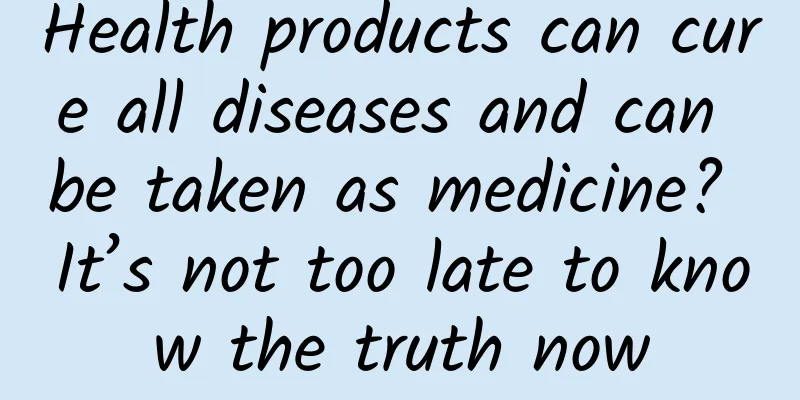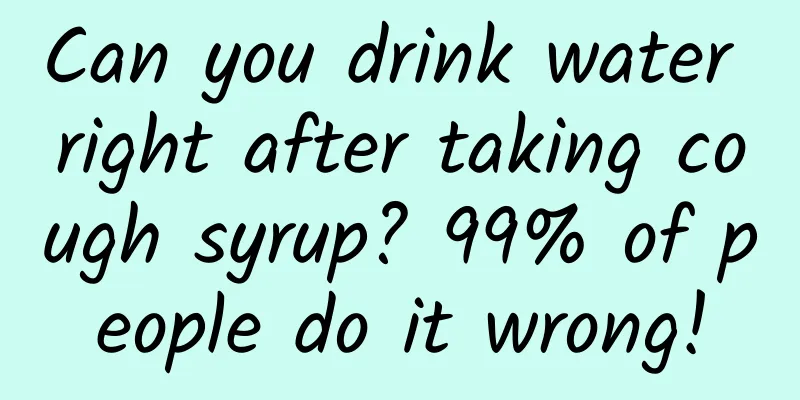Health products can cure all diseases and can be taken as medicine? It’s not too late to know the truth now

|
gossip "Health supplements can treat many diseases and have no side effects. Are they better than taking medicine?" Many health products are advertised as being able to cure all diseases, and many consumers flock to them. Rumor Analysis There is no basis for this statement. Health care products and medicines are two completely different things. You must never use health care products to replace medicines. With the continuous improvement of living standards and the increasing aging of the population in my country, more and more middle-aged and elderly people are paying more and more attention to their health problems. However, in terms of health maintenance and chronic disease conditioning, a very common phenomenon now is that many middle-aged and elderly people firmly believe that health products can "cure diseases" and can replace medicines. Is this really reliable? Today's popular science article will talk to you about this topic. Copyrighted stock images, no reproduction allowed What is the difference between health supplements and medicines? Many people may be confused about the difference between health products and medicines. They know that there may be some differences between the two, but they can't explain why. Some people, especially the elderly, sometimes even think that health products can cure all diseases without side effects, while medicines have limited effects and may have hidden dangers. This is of course not true. The reason for this perception is that some unscrupulous businesses have over-promoted health products . **It is very important to understand the difference between health products and medicines in order to distinguish the scope of application of the two. Let's talk about it in detail. In terms of definition, health products are also called health foods and dietary supplements. As the name suggests, it is a kind of food with health functions. It has the common properties of general foods, can regulate human functions, and is used for consumption by specific groups of people, but is not intended to treat diseases. The key point is that health supplements are first and foremost a type of “food”. Medicines are used to control, prevent and treat diseases, and have clear indications, applicable populations, usage and dosage. The difference between the two is self-evident. Health products, as food, are like rice, noodles and steamed buns. They do not have the effect of treating, preventing and regulating diseases. Medicines are the "correct answer" to diseases. Copyrighted stock images, no reproduction allowed Although some people may not be able to tell the difference, it is not difficult to tell the difference between health products and medicines. Why? Because it is clearly written in black and white. If we can't tell whether it's a health product or a medicine, we just need to pick up a box of products and look at the approval number. The approval number of health products is usually "国食健字XXXX", and there will be a small blue cap logo on the outer packaging. Little blue hat logo, source see picture The approval number of a drug is generally "National Medicine Standard No. XXXX". The packaging will clearly state the indications, applicable population, usage and dosage, and will also be marked with OTC (over-the-counter drugs), Rx (prescription drugs) and other logos. For those who do not know whether the product they purchased is a drug or health product, you may wish to distinguish it in this way. Approval number: National Medicine Standard and OTC logo, source: see picture So what is the essential difference between health products and medicines? In terms of declaration, quality research, production supervision, etc., the requirements for medicines are much stricter than those for health products . Whether it is the requirements for declaration materials, the level of research, quality control after approval, and regulatory requirements, medicines are much more stringent than health products. Therefore, in terms of quality assurance, medicines are more secure than health products, especially for some related ingredients that may be contained in both medicines and health products. If the labeled content is the same, it is recommended that you should try to choose products with pharmaceutical numbers if there is a real need. Can health supplements replace medicines? I believe that after reading the previous content, everyone should have the answer in their mind, that is, **health products cannot replace medicines. **But in real life... those who sell health products are too deceptive. Although health products have a clear definition, and the country has various regulations and restrictions on the promotion of health products, many health products will play "edge ball" in the process of promotion and sales. Live sales loudly claim that certain health products have the health benefits of improving body functions, and can also have the effects of treating, improving, and preventing diseases. At the same time, they promote that they are safer than drugs. This kind of promotional method will indeed make the relevant audience excited, but can health products really replace daily routine treatment drugs? The answer is of course no! Especially for some chronic diseases, such as high blood pressure, high blood lipids, diabetes, etc., in general, if the relevant indicators cannot be reversed through lifestyle adjustments, it is necessary to use medication as early as possible and reasonably to improve and control the disease . If you choose health care products and give up taking medicine because you believe in the false and exaggerated propaganda of certain health care products, the risks brought about by this practice will be very great. Copyrighted stock images, no reproduction allowed If family members insist on believing that health supplements can control blood pressure, blood lipids, and blood sugar, and refuse to take medication, then we must monitor and understand the changes in related indicators after stopping medication. At this time, we often find that **stopping medication and taking so-called "cure-all" health supplements will eventually lead to related indicators getting out of control. **At this time, we must quickly try to use evidence to convince family members to take regular medicines to avoid greater cardiovascular and cerebrovascular risks. Abuse of health supplements is harmful It is undeniable that in real life, it is not uncommon for people to believe in health care products or even use them instead of medicines because of excessive publicity for them. On the one hand, this phenomenon reflects the exaggerated publicity chaos in the health care product market. On the other hand, it also reflects that many middle-aged and elderly people are worried about the safety of long-term medication. In fact,** for patients, it is very important to use medicines reasonably and regularly, monitor relevant control indicators regularly, and regulate and control related diseases to reduce the possibility of major health problems. ** However, the risks of abusing health products, or even replacing medicines with health products, or stopping taking medicines after taking health products are still very high. Copyrighted stock images, no reproduction allowed First of all, health care products are food, not medicine, and cannot cure diseases. Secondly, some health care products are often expensive while being over-advertised. The economic pressure caused by taking health care products in large quantities for a long time cannot be ignored. Finally, there is still a certain gap between health care products and medicines in terms of quality control. Abuse of health care products, even the belief that health care products are non-toxic and harmless, and excessive use, may also lead to excessive intake of certain effective ingredients, bringing related health hazards and risks of liver and kidney damage. **There are also some so-called "especially effective" health care products that rely on the illegal addition of certain drug ingredients, which also poses great hidden dangers to the body. Some time ago, the incident that Kobayashi Pharmaceutical's red yeast rice raw material caused kidney failure or even death in those who took it made headlines. This reminds us that the quality control of health products is difficult to compare with that of medicines, and the safety issues that may be caused by the abuse of health products cannot be ignored. Should we use health supplements? How should we use them? Having said so much, some friends may think that "health supplements = IQ tax". In fact, this is a bit extreme. We don't need to completely deny the efficacy and function of health supplements. Compared with medicines, the efficacy and purpose of health care products are not to cure diseases, but to maintain health. For middle-aged and elderly people, as they age, their body's ability to absorb nutrients will gradually decline, and during the aging process, certain nutrients in the body, such as calcium, will be lost at an accelerated rate. Under this premise, it is actually very helpful for middle-aged and elderly people to take dietary supplements appropriately to supplement the body's nutritional needs on the basis of a reasonable combination of dietary nutrition. For example, for women in menopause or postmenopause, taking calcium, vitamin D and other supplements reasonably is a very important nutritional supplement for preventing and delaying the progression of osteoporosis. In addition to additional nutritional supplements, another function of health supplements is to improve body functions, such as anti-oxidation, improving fatigue, etc. These are among the possible effects of health supplements, but these effects have nothing to do with conditioning and treating diseases. Therefore, for people who are often tired and have imbalanced body functions but have not been diagnosed with any disease, it is no problem to use health supplements to regulate and improve body functions (don’t forget to rest, exercise, and have regular physical examinations). Copyrighted stock images, no reproduction allowed In short, **it is not that we cannot use health care products, but we should not rely on them to cure diseases, nor should we rely solely on taking health care products to the point of ignoring healthy living habits. **Please remember to correctly understand the role of health care products, distinguish their differences from medicines, and do not use health care products to replace medicines at will. Looking in the mirror of rumors Middle-aged and elderly friends should keep their eyes open and be wary of excessive promotion of health products. The so-called "cure for all diseases" may not be able to cure anything; the so-called "pure natural" may just be a gimmick to raise prices; the so-called "safer" may only be a promotional method, and excessive intake may also bring risks. Author | Li Jin, Deputy Director Pharmacist, Deputy Head of the Youth Studies Group of the Medical Committee of the China Science Writers Association Review | Liu Guiyang, Chief Pharmacist, Fourth Medical Center, PLA General Hospital |
<<: Why are you always bitten by mosquitoes? Why are you so delicious in the eyes of mosquitoes?
>>: Which Doraemon gadget is the most powerful? Some of them have actually come true
Recommend
In order to survive, they can go without pooping for several months | Nature Trumpet
Welcome to the 67th issue of the Nature Trumpet c...
A case of monkeypox was discovered in Shenyang. One picture shows you the true face of monkeypox!
According to the official website of Liaoning Pro...
Complete channel drainage in 4 steps to double your new customer acquisition and conversion efficiency!
When many online education companies are first es...
Yangjiang mini program development company, which company should I look for for WeChat mini program development?
Yangjiang mini program development company, which...
Ten million level channel delivery methodology, save your advertising costs!
In daily delivery, many SEM partners, when encoun...
Product experience is not good? Let’s take a look at the three steps to improve user experience!
We prefer to develop new features (or products) b...
Global Economic Forum: Using GenAI to increase employment and improve labor productivity
Generative artificial intelligence (GenAI) has th...
Android M tries to get more AOSP apps into the Play Store
Google released a technical preview of the next v...
A perfect event planning solution cannot be without these elements!
Do you hope that the event will become a hit? Tha...
The latest guide to French fry ads on Xiaohongshu!
Has Xiaohongshu made everyone feel like they’re o...
Practical information: Summary of views from the 4G mobile phone and virtual operator summit
From September 10 to 13, the 4G Mobile Phone and ...
This is the most in-depth article about content operation
Content operation belongs to the persuasion line ...
Baidu and Volkswagen have reached a strategic cooperation and the research and development project around autonomous parking has been launched
On November 2, the second Baidu Apollo Council wa...
What are the "Fermi Paradox" and the Great Filter Hypothesis? Does the cosmic civilization filter really exist?
After the "Fermi Paradox" about aliens ...
Many snacks failed the random inspection! Microbial contamination, excessive additives... Many people don't understand these hazards
Expert of this article: Pa Lize, Chief Physician ...









